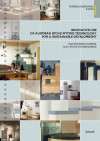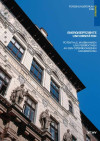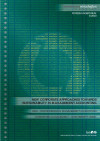Suchergebnisse
SIBAT - Ensuring indoor air quality of buildings - inclusion of toxicological criteria in the assessment of building materials

Development of a pragmatic assessment scheme applicable to building practice for the impact of building products on human health
Vernetzte Planung als Strategie zur Behebung von Lern- und Diffusionsdefiziten bei der Realisierung ökologischer Gebäude

Eine Untersuchung der Rolle kooperativer Organisationsformen des Planungsteams hierzu und Ausarbeitung handlungsorientierter Empfehlungen und Materialien zur Vermittlung für die Praxis
Test stand method for the determination of system efficiency and emission factors of small-scale biomass combustion systems
Determination of key data with practical relevance of typical applications in only one test run. Monitoring of air pollutants and efficiency and continuous improvement of technology possible with test stand method.
Berichte aus Energie- und Umweltforschung 3/1997 Einflussfaktoren und Strategien bei der Implementierung von umweltverträglichen Abwasserkonzepten in ländlichen Regionen

Identifizierung von Akteuren, Entscheidungsfaktoren, Umsetzungshindernissen und möglicher Strategien
Innovative Use Of Austrian Stove Fitting Technology For A Sustainabl Development

Tile stoves in Austria - Clay stoves in Zimbabwe
Forschungsforum
2/2000
Herausgeber: BMVIT
Englisch, 6 Seiten
Downloads zur Publikation
Berichte aus Energie- und Umweltforschung 8a/1996 Biogas-Tagung - Teil 1

Abstracts der Vorträge und Zusammenfassung der Ergebnisse der Arbeitsgruppensitzungen
Assessment of user requirements and technical feasibility of lightweight applications based on renewables
Assessment of user requirements was studied. Furthermore, the technical feasibility of se-lected lightweight applications based on renewables in the furniture and interior design sector is investigated through involvement of all relevant stakeholders (panel manufacturers - further processing enterprises - distributors - consumers) in the value chain.
Environmental, Material Flow and Sustainability Management Accounting - Offensive diffusion in adult education
Diffusion of the "Factory of Tomorrow" project line on environmental and material flow cost accounting (EMA and MFCA) for corporate and national system boundaries, as well as related tools for sustainability accounting in existing post graduate studies.
Dezentral nachhaltige Energieversorgung als virtuelles Kraftwerk unter Nutzung von Demand Side Management
Zur kosteneffizienten und nachhaltigen Energieversorgung müssen Wind-, Photovoltaik- und Biomasseanlagen in die bestehenden Netze integriert werden. Um das Regelverhalten zu verbessern, werden DMS-Methoden und virtuelle Kraftwerke untersucht.
Sustainability Reporting - Guidelines for Sustainability Reporting based on reporting processes of VA Technologie and Österreichische Bundesforste
Scientific attendance of sustainability reporting processes in two partner enterprises (VA Tech and ÖBf AG). Development of the guideline "Reporting about Sustainability" based on these practical experiences.
Total Quality Design and Assessment of buildings as a strategy to increase the level of know-how with regard to the issue of "sustainable buildings".

Total Quality Design and Assessment is an instrument to increase the demand for high quality buildings; "high quality" in terms of improved comfort as well as decrease in negative environmental impact, at affordable costs. Application of TQ design targets requires additional and new knowledge, thus increasing the level of know-how with regard to the issue of "sustainable buildings".
Energieeffiziente Universitäten

Potentiale, Maßnahmen und Perspektiven an den österreichischen Universitäten
Forschungsforum
3/1999
Herausgeber: BMVIT
Deutsch, 6 Seiten
Downloads zur Publikation
Practice Guide for Sustainable Building Sanitation and Modernisation within Construction Intents

A checklist considering priority, construction progress and actors is elaborated to serve a future-oriented selection of materials, energy carriers, design and construction within building sanitation, under a deliberate consideration of the involved actors from the construction branch
Berichte aus Energie- und Umweltforschung 19/2001 Stoffliche Nutzung nachwachsender Rohstoffe in Österreich - Marktanalyse und Handlungsmaßnahmen

Identifizierung von Zukunftsmärkte und Ausarbeitung von Hemmnissen für eine verstärkte industrielle und gewerbliche Nutzung nachwachsender Rohstoffe in Österreich
Berichte aus Energie- und Umweltforschung 12/2001Machbarkeitsstudie zur Errichtung eines thematischen Netzwerks E3building im Rahmen von PREPARE

Vorprojekt über den Aufbau eines Informations-Netzwerks für nachhaltiges Bauen mit Schwerpunkt auf die Zusammenarbeit unterschiedlicher Akteure in Planung, Errichtung und Erhaltung von Gebäuden.
Mehrsprachig
New Corporate Approaches Towards Sustainability In Management Accounting

EMA - Environmental Management Accounting Integrated Management - Cost-/Benefit Check
Forschungsforum
3/2003
Herausgeber: BMVIT
Englisch, 6 Seiten
Downloads zur Publikation
Marktchancen und technische Grenzen von Leichtbauprodukten basierend auf nachwachsenden Rohstoffen
Erhebung der Nutzeranforderungen und technische Bewertung des Umsetzungspotentials von ausgewählten Leichtbauprodukten basierend auf nachwachsenden Rohstoffen durch Einbeziehung aller Akteure (Produzenten - Weiterverarbeiter - Handel - Konsumenten) der Wertschöpfungsketten im Möbel- und Innenausbau.
Kriterienkatalog zur Qualitätssicherung in der Ausführung von Passivhäusern in Holzbauweise
Mögliche Fehlerquellen bei der Ausführung von Passivhäusern in Holzbauweise sollen gewerkspezifisch und beim Einbau haustechnischer Anlagen durch einen Kriterienkatalog aufgezeigt, Lösungen erarbeitet und ein baustellentaugliches Kontrollinstrument zur Verfügung gestellt werden.
Berichte aus Energie- und Umweltforschung 8b/1996 Biogas-Tagung - Teil 2

Studie zum Stand der Biogastechnik in Österreich
